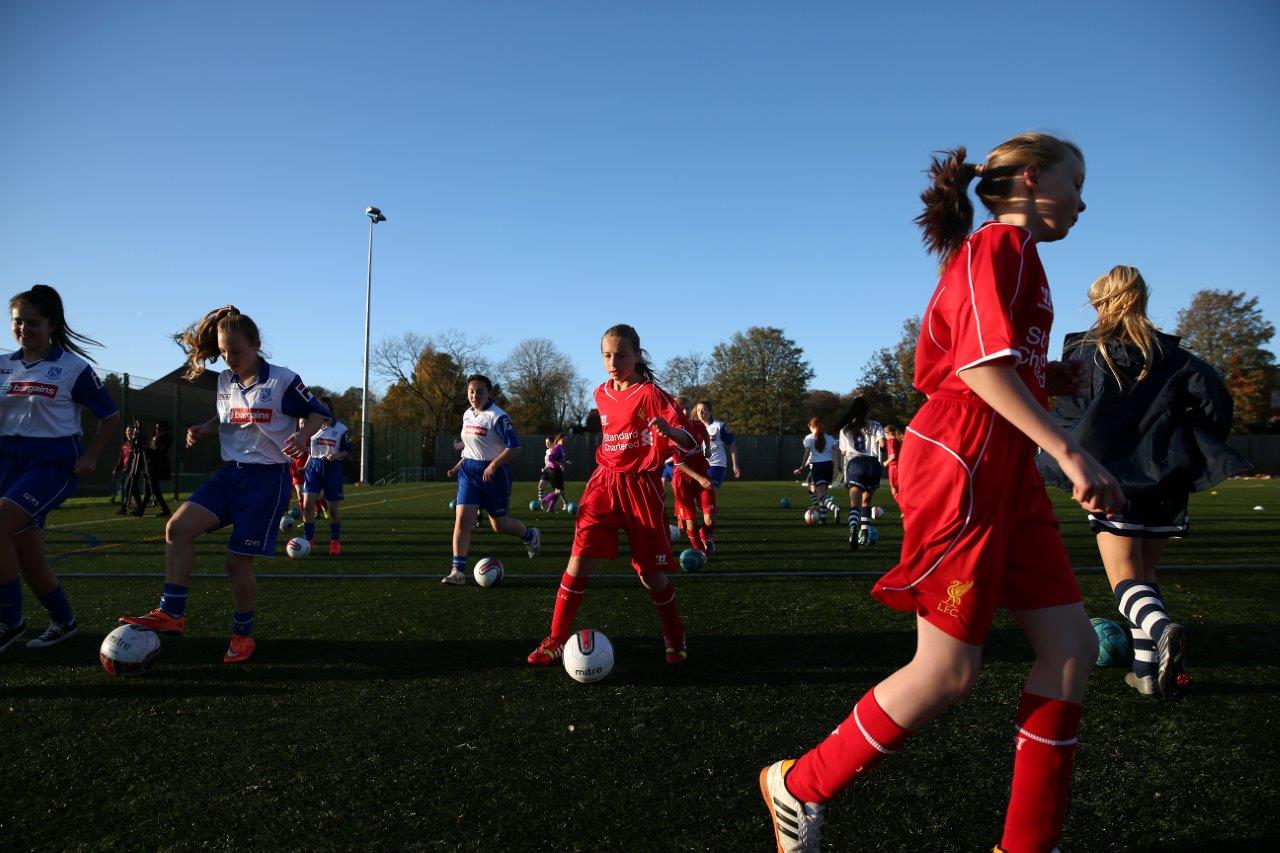A flagship programme to encourage more women and girls to play football has exceeded its annual target for participants. Since the two-year FA scheme was launched in October 2013, 20,992 girls and young women (between the ages of 14 and 25) have taken part in the football sessions, which run for 30 weeks of the year.
England and Liverpool stars Fara Williams and Natasha Dowie were at Cowley International College in St Helens, Merseyside on Wednesday [5 November] to meet young women who have taken up playing football, in sessions run by Liverpool, Tranmere and Preston North End, as part of the FA programme.
The initiative was created when The FA, Sport England, the Premier League and the Football League Trust joined forces to provide new grassroots football sessions. The target is that by August 2015, 40,000 girls and young women will have participated in football through the scheme. It is the first time all four bodies have worked together on a project such as this.
The sessions have been delivered by 87 member clubs of the Premier League and Football League, following £2.4 million of National Lottery money from Sport England invested into The FA, for the specific development of the women’s game. The programme is part of the FA’s wider strategy on growing participation figures for women’s football and its vision to be the 2nd largest team sport [after men’s football] by 2018.
Kelly Simmons, FA director of national game and women’s football, said: “When we launched our Game Changer strategy for developing women’s football in 2012, growing participation was a key objective for us. Working alongside our partner organisations to deliver such excellent results demonstrates just what potential there is for women’s football in this country, at both grassroots and elite levels.”
“One of our biggest challenges, apart from attracting new players, is retention, so programmes like this which run for long periods of time, will certainly help us tackle that and help women’s football to become the second most-played sport in the country.”
Jennie Price, Sport England Chief Executive, said: “It is great to see so many women and girls taking up the opportunity to play football thanks to this programme. Getting women and girls active is really important to us. We know women play less sport than men but most would like to do more. In fact, almost 120,000 women tell us that they want to play football. But the opportunities have to be right for those women, to turn ambition into a reality.”
“Our investment in the FA for the delivery of Premier League Girls Football and the Football League Trust Girls’ Programme is helping us do this by giving young women the chance to try football and get quality coaching in a way tailored to them. By working together we can continue to address the barriers to women’s participation and close gender gap in sport.”
Simon Morgan, Head of Community Development at the Premier League said: “The Premier League is proud to have been a trailblazer for the Sport England satellite club model that works so well in engaging young people in sport and promotes a sporting habit for life. This initial positive experience, allied to the unique ability of PL clubs to continue to engage, motivate and inspire young people has made the first year of this collaborative girls’ programme such a success.”
“The quality of experienced and qualified Premier League club coaches has also had a demonstrable effect in retaining and sustaining this participation by the girls involved. We are not taking anything for granted, but these first year results have surpassed our expectations and give us great cause to be confident of even greater success going forward.”
Mike Evans, general manager of the Football League Trust, said: “Football clubs are at the heart of their communities and have an emotional pull that enables them to reach a vast amount of people. Our network of league clubs means we can access and influence communities all around the country and we aim to use this power to make a positive difference to people’s lives. This, as well as developing a strong partnership with the County FAs, has enabled us to provide ‘fun and fitness’ to close to 15,000 women and girls in the first year of the programme.”
Minister for Sport Helen Grant said: “It’s great news that more girls and women are getting into football at a time when so much effort is going in to strengthen and raise the profile of women’s sport generally. These results show what can be achieved when the FA, Premier League, Football League Trust and Sport England all pull together and shows the growing demand and interest there is in women’s football in this country.”









